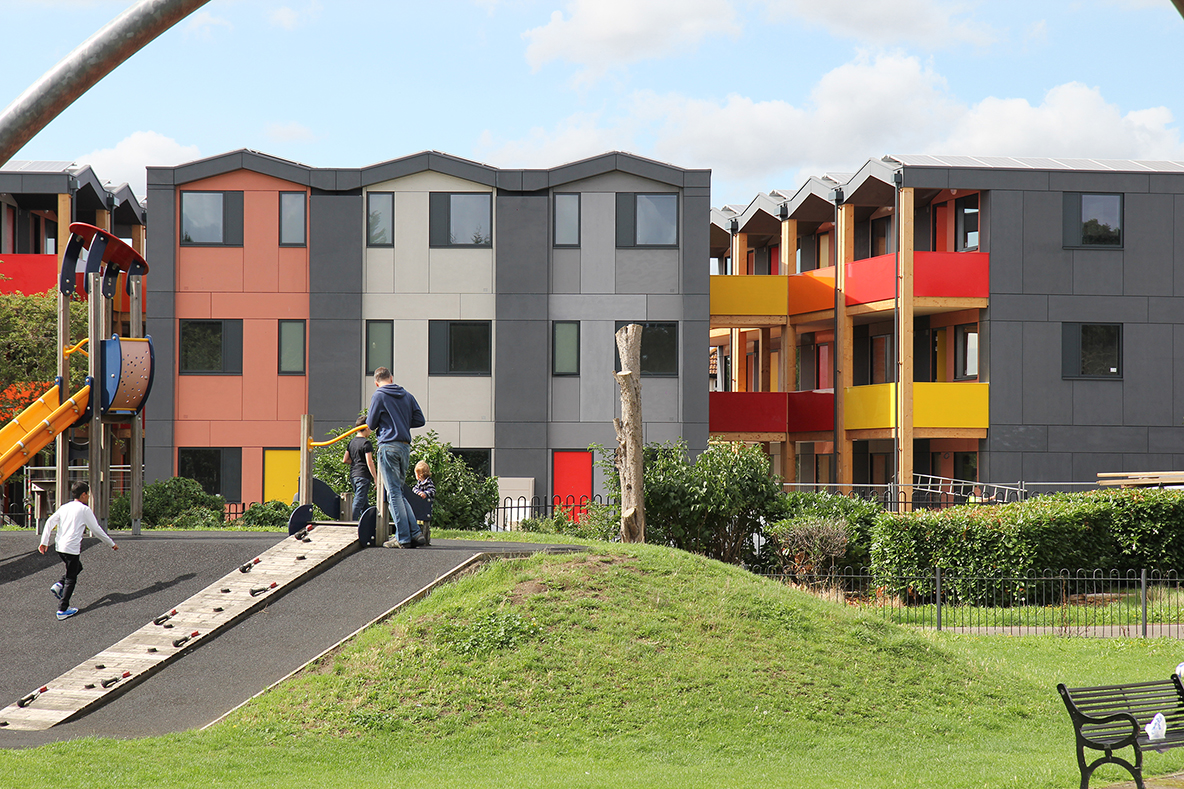Y:Cube development in Mitcham
On 8 September 2015, an innovative, factory-built affordable housing scheme in south west London welcomed its first tenants.
The 36-apartment Y:Cube development was designed as ‘move-on accommodation’ for single people leaving homelessness hostels and supported housing schemes. It was developed by the YMCA, the world’s oldest and largest youth charity and is located in Clay Avenue in Mitcham, south west London.
Y:Cube tenants will all have a local connection to the area. Half will be YMCA residents currently living in YMCA accommodation in South West London, and the other 50% will be nominations from Merton Council. Y:Cube Housing has an anticipated length of stay of three to five years.
Y:Cube was designed by renowned architecture practice Rogers Stirk Harbour + Partners (RSHP) and unveiled by the Minister of State for Housing and Planning, Brandon Lewis MP.
The apartments are rented out at 65% of the market rate for the area. This is possible because of the low cost of the development, achieved using off-site construction methods, which also meant that the build programme lasted just five months. The 36 Y:Cube units were built in Derbyshire before being transported to London. Construction on the three-storey site started in March and the last home was completed in August.
Y:Cube uses a pre-constructed modular system that enables units to stack on top or alongside each other, making it adaptable to the size and space available and well-suited to tight urban sites. Each unit is constructed from high-quality, environmentally-efficient materials (mainly renewable timber), creating accommodation that requires little or no heating, even in the winter.
The Y:Cube units are 26sqm studio-like apartments, for single occupancy. Each unit is constructed in the factory with all the services already incorporated. Water, heating and electricity can be connected to existing facilities or to other Y:Cubes already on site. Additional units can be added if needed and whole developments can be taken apart and rebuilt in new locations.
Along with investment from YMCA London South West, the Y:Cube development in Mitcham was funded with a grant of £337,000 from the Mayor of London’s Building the Pipeline scheme and ‘social investments’ from City Bridge Trust, Tudor Trust, Trust for London and Esmée Fairbairn Foundation. It was created in partnership with RSHP, project manager Aecom, and contractor SIG Plc Building Systems.
Wendy Omollo, 24, was one of the first Y:Cube tenants, having previously been homeless. She said: “By having my own space with my own front door I will regain my independence. But it’s not just that. As the rent is affordable and I can stay for up to five years, I’ll also be able to save money for a deposit. Basically, when the time comes to move on from Y:Cube, I will be in a far better situation than today.”
Richard James, Chief Executive of YMCA London South West, added: “Y:Cube presents a new way of creating genuinely affordable aspirational housing for single people in housing need. Great design and an innovative construction system have helped us in developing a housing scheme that challenges traditional housebuilding methods.”
Ivan Harbour, Senior Partner and Lead Architect for Y:Cube at RSHP, said: “Y:Cube offers generous space and exceptional insulation, daylight and acoustics. By delivering high-quality accommodation using quick and cost-effective volumetric technology, we hope to offer a new model for house building in the future.”
YMCA hopes to roll out other similar Y:Cube schemes across London and other parts of England in the near future.
[edit] Find out more
[edit] Related articles on Designing Buildings Wiki
Featured articles and news
A case study and a warning to would-be developers
Creating four dwellings... after half a century of doing this job, why, oh why, is it so difficult?
Reform of the fire engineering profession
Fire Engineers Advisory Panel: Authoritative Statement, reactions and next steps.
Restoration and renewal of the Palace of Westminster
A complex project of cultural significance from full decant to EMI, opportunities and a potential a way forward.
Apprenticeships and the responsibility we share
Perspectives from the CIOB President as National Apprentice Week comes to a close.
The first line of defence against rain, wind and snow.
Building Safety recap January, 2026
What we missed at the end of last year, and at the start of this...
National Apprenticeship Week 2026, 9-15 Feb
Shining a light on the positive impacts for businesses, their apprentices and the wider economy alike.
Applications and benefits of acoustic flooring
From commercial to retail.
From solid to sprung and ribbed to raised.
Strengthening industry collaboration in Hong Kong
Hong Kong Institute of Construction and The Chartered Institute of Building sign Memorandum of Understanding.
A detailed description from the experts at Cornish Lime.
IHBC planning for growth with corporate plan development
Grow with the Institute by volunteering and CP25 consultation.
Connecting ambition and action for designers and specifiers.
Electrical skills gap deepens as apprenticeship starts fall despite surging demand says ECA.
Built environment bodies deepen joint action on EDI
B.E.Inclusive initiative agree next phase of joint equity, diversity and inclusion (EDI) action plan.
Recognising culture as key to sustainable economic growth
Creative UK Provocation paper: Culture as Growth Infrastructure.






















